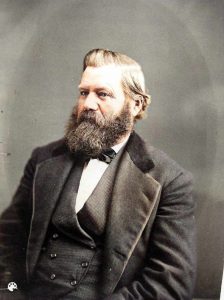Philo T. Farnsworth: Pioneer, Family Man, and Advocate of Peace

[tta_listen_btn]

In the annals of history, the stories of pioneers stand as a testament to endurance, faith, and resilience. Philo Taylor Farnsworth, a figure enshrined in the early Mormon experience, emerges as one such pioneer whose life’s journey was marked by dedication, devotion, and a commitment to his beliefs.
Early Life and Conversion:
Philo T. Farnsworth was born on January 21, 1826, near Burlington, Ohio, along the Hockhocking River. He was the ninth child of Reuben and Lucinda Kent Farnsworth. The seeds of faith were sown early in his life when he encountered the teachings of Franklin D. Richards, a fellow youth who introduced the gospel to their community. Philo embraced these teachings and was baptized around the age of 17.
Embrace of the Gospel and Early Struggles:
Philo’s embrace of the gospel led to a pivotal moment of choice. His commitment to his beliefs clashed with his father’s disapproval, prompting him to leave home and journey to Nauvoo, Illinois, the heart of early Latter-day Saint settlement. Through mobbings, persecutions, and trials, Philo remained steadfast, contributing to the construction of the Nauvoo Temple and playing an active role in the Nauvoo Legion.
Westward Bound:
In 1848, the pioneers entered the Salt Lake Valley, and Philo T. Farnsworth arrived in Utah the following year as part of the Franklin D. Richards company. Settling in Pleasant Grove, he contributed to the growth and development of various communities, including assisting in the establishment of the Utah State House in Fillmore.
Family and Community Roles:
Philo’s life was characterized by his roles as a family man, community leader, and advocate for peace. He married Margaret Yates in 1848, with whom he had a family. Philo’s responsibilities expanded as he became a bishop in the Beaver Ward, serving from 1857 to 1864, and later becoming a High Councilman in 1877.
A Multifaceted Life:
Philo T. Farnsworth’s life journey included various positions of influence and service. He held positions as a Probate Judge in Beaver County, a member of the Territorial Legislature, and even served as the mayor of Beaver City. He demonstrated his versatility as a farmer, freighter, and community leader, leaving an indelible mark on the areas he touched.
Advocate for Peace:
Philo’s connection to the Piute Indians stands as a testament to his commitment to fostering understanding and harmony. He served as a mediator and friend to the Piute tribe, contributing to peace efforts among them and leaving a legacy of unity and cooperation.
Final Days and Legacy:
Philo T. Farnsworth’s life came to an end on July 29, 1887, at the age of 61 years, 6 months, and 10 days. His passing marked the conclusion of a life well-lived, characterized by dedication to his family, community, and beliefs. His legacy endures through the generations he left behind and the stories that continue to inspire.
As a pioneer whose footsteps left an indelible imprint on the landscape of faith, family, and community, Philo T. Farnsworth’s story stands as a testament to the unyielding spirit that defines the early Mormon experience. In a world marked by change and progress, his legacy reminds us of the enduring values that shape our lives and the bonds that connect us to those who paved the way.

